News & Announcements
- Details
- Written by Laura Mirsky
You may download a PDF of this article for your personal use.
 Students at a Detroit Tigers baseball game.Detroit, Michigan, USA, can claim some of the highest rates of crime, violence, school expulsion, dropouts and truancy in the country. But as Henry McClendon, a pastor, program officer with the Skillman Foundation and IIRP licensed trainer and board member observed, “We don’t have a crime problem, we have a relationship problem.” To address this problem, McClendon aims to “infuse restorative practices in every major institution in the city, particularly those that touch kids, but adults as well: schools, social work, criminal justice, families and faith communities.”
Students at a Detroit Tigers baseball game.Detroit, Michigan, USA, can claim some of the highest rates of crime, violence, school expulsion, dropouts and truancy in the country. But as Henry McClendon, a pastor, program officer with the Skillman Foundation and IIRP licensed trainer and board member observed, “We don’t have a crime problem, we have a relationship problem.” To address this problem, McClendon aims to “infuse restorative practices in every major institution in the city, particularly those that touch kids, but adults as well: schools, social work, criminal justice, families and faith communities.”
Recognizing that this goal needed an established organization within the city to “carry the ball,” he brought the idea to Alice Thompson, CEO of the influential Detroit nonprofit social services agency Black Family Development, Inc. (BFDI). Thompson immediately saw restorative practices’ potential, and BFDI became an affiliate of the IIRP, licensed to train other organizations.
- Details
- Written by Joshua Wachtel
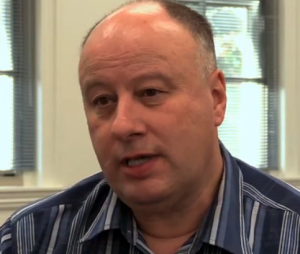 Les Davey, CEO IIRP EuropeWith nearly 20 years experience in the UK and Ireland plus affiliates and associates throughout Europe, IIRP Europe (formerly IIRP UK & Ireland) is poised to increase offerings across the continent for training, graduate education and research into restorative practices.
Les Davey, CEO IIRP EuropeWith nearly 20 years experience in the UK and Ireland plus affiliates and associates throughout Europe, IIRP Europe (formerly IIRP UK & Ireland) is poised to increase offerings across the continent for training, graduate education and research into restorative practices.
IIRP Europe CEO Les Davey said, "Working with our colleague Vidia Negrea in Hungary (IIRP Europe, Director for Central Europe), we are looking to bring together existing associates of the IIRP in Sweden, the Netherlands, the UK and Ireland, plus new colleagues we’re starting to develop relationships with elsewhere in Europe, in such a way that people can go to one source to find out what restorative practices is about and what’s available in their area."
- Details
- Written by Joshua Wachtel
Henry McClendon, a pastor, program officer with the Skillman Foundation and IIRP licensed trainer and board member, delivered this talk at the IIRP's 16th World Conference in October, 2013, in Bethlehem, Pennsylvania, USA.
- Details
- Written by Laura Mirsky
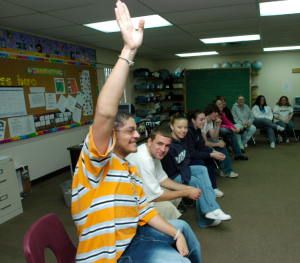 CSF and Buxmont Academy teachers are engaging and involving students in learning by using restorative practices to teach academic subjects.
CSF and Buxmont Academy teachers are engaging and involving students in learning by using restorative practices to teach academic subjects.
Chris Boretskii, coordinator of the CSF Buxmont Pottstown School, talks about Pottstown’s social studies teacher, Michael Packard, as an example.
“His classes are almost exclusively taught in a circle,” says Chris. This makes it an expectation that every student will contribute. Students are engaged to participate this way in discussions of current events and history.
"We don’t allow kids to be invisible,” adds Chris. “Everyone has to participate and be verbal. This creates confidence and boosts kids' self-esteem, which can't help but improve their academic performance."
Michael takes the restorative concept of participation and engagement further. He prepares students for tests in a circle, asking them to come up with some pertinent questions to ask in tests.
And the kids love it. Says one student, “Circles make me feel more involved because I am able talk a lot easier. I think if we weren’t in a circle other kids wouldn’t want to participate.”
- Details
- Written by Joshua Wachtel
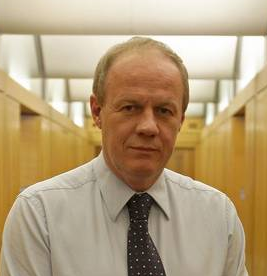 UK Justice Minister Damian GreenAccording to a number of reports in the UK, including this one from the Belfast Telegraph:
UK Justice Minister Damian GreenAccording to a number of reports in the UK, including this one from the Belfast Telegraph:
At least £29 million will be made available over the next three years for restorative justice - the process of bringing those whose lives have been ruined by crime or conflict together with those responsible for the harm.
A recent study by the Ministry of Justice (MoJ) linked the conferencing process with a 14% cut in re-offending, while 85% of victims who took part said they were satisfied with the experience.
- Details
- Written by Joshua Wachtel
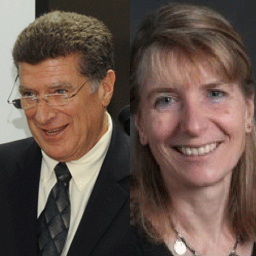 Ted Wachtel and Nicola Preston will co-teach the IIRP's new fully online "gateway" course, "Restorative Practices: The Promise and the Challenge"“Restorative Practices: The Promise and the Challenge,” a new graduate course from the International Institute for Restorative Practices, will be offered for the first time during the Spring 2014 term. This elective course (RP 506) is the first IIRP offering that will be completely online with no pre-requisites.
Ted Wachtel and Nicola Preston will co-teach the IIRP's new fully online "gateway" course, "Restorative Practices: The Promise and the Challenge"“Restorative Practices: The Promise and the Challenge,” a new graduate course from the International Institute for Restorative Practices, will be offered for the first time during the Spring 2014 term. This elective course (RP 506) is the first IIRP offering that will be completely online with no pre-requisites.
IIRP Founder and President Ted Wachtel, who will co-teach the class, said, “I’m excited about the opportunity to produce a really fun, interactive course that engages people in thinking and talking about restorative practices from anywhere in the world. For all of our other beginning courses people have to attend something. There are so many people that have contacted us that want to take a course but aren’t in a position to travel."
- Details
- Written by Joshua Wachtel
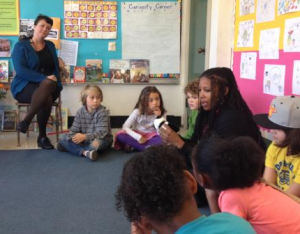 Photo by Jen ChienJan Chien, of San Francisco local public radio KALW, reports on restorative practices at Harvey Milk Elementary School:
Photo by Jen ChienJan Chien, of San Francisco local public radio KALW, reports on restorative practices at Harvey Milk Elementary School:
In addition to the whole-school circle in the morning, each class has its own daily community circle. Every classroom has a carpeted area where students and teachers sit on the floor to share their thoughts or feelings. In Marisa Martinez’s 3rd grade class, students pass a small stuffed panda around the circle, to mark who has the floor. Today they’re talking about people or animals that have passed on.
- Details
- Written by Joshua Wachtel
This video includes the entire plenary session from day three of the IIRP’s 16th World Conference on the topic of restorative practices in faith communities. Bruce Schenk, director of IIRP Canada, moderated the panel. The panelists included:
- Details
- Written by Joshua Wachtel
Anne Martin, director of restorative practices for Shalem Mental Health Network in Ontario, Canada, recently reviewed Margaret Murray's new mystery, Forging Justice.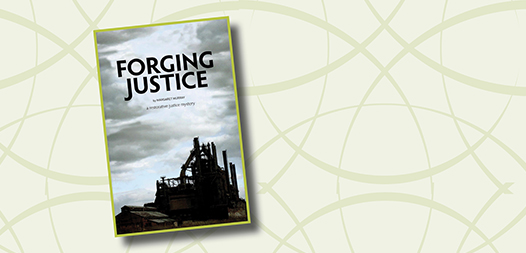
Police Detective Claire Cassidy, the protagonist of Margaret Murray’s recently published novel Forging Justice: A Restorative Justice Mystery, is ready to quit her job. When it appears that Pee Wee Lebovitch has reoffended, this time killing an elderly woman, and three teenage girls have brutally attacked a storeowner leaving him in a coma, Claire has had it. She feels she cannot help keep the city safe. Her twelve years on the police force in Bethlehem, Pennsylvania feel like a waste of time. Is it time to turn in her badge?
While investigating the attack on the storeowner, Claire meets Democracy High School’s vice-principal Daniel Pierce. “Adolescence is a special kind of hell,” Claire thinks as she drives up to the school. “And high schools are surely one of its torture chambers.”
- Details
- Written by Joshua Wachtel
 The International Institute for Restorative Practices has been invited to present plenaries and breakout sessions at a series of summits across New York State to share how restorative practices can be used in schools to help end the school-to-prison pipeline and transform disciplinary policies that disproportionately impact minority youth.
The International Institute for Restorative Practices has been invited to present plenaries and breakout sessions at a series of summits across New York State to share how restorative practices can be used in schools to help end the school-to-prison pipeline and transform disciplinary policies that disproportionately impact minority youth.
The New York State Permanent Judicial Commission on Justice for Children, chaired by Former Chief Judge Judith S. Kaye, has been working on issues regarding exclusionary school discipline and its connection to the justice system for the last few years. With funding from The Atlantic Philanthropies, the commission is currently hosting a series of regional summits from October, 2013 through April 2014.

Restorative Works Year in Review 2024 (PDF)
All our donors are acknowledged annually in Restorative Works.
